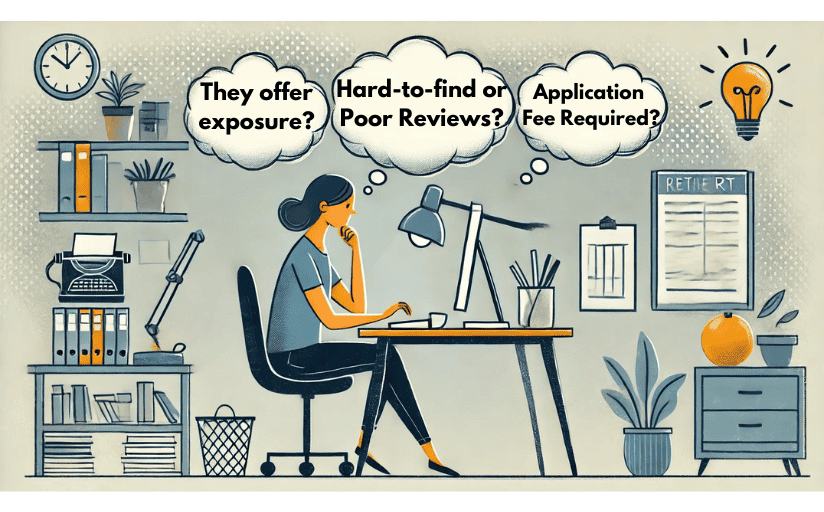I’ve been freelancing and working from home for 12 years, and I’ve been freelance writing for four years, so I can tell you that legitimate work-from-home writing jobs are not unicorns. They do exist, and they can be very rewarding.
Unfortunately, they can also be difficult to find. Because of the huge demand for work-from-home jobs, bad actors see an opportunity to take advantage of others for their own gain. Therefore, job listings are flooded with entries that are really scams, and it can be difficult to sift through them to find real jobs. Knowing the warning signs can help you avoid scams and find legitimate job opportunities.

What Does It Mean When Work-From-Home Writing Jobs Offer You Exposure?
When a job listing for a work-from-home writing job offers you exposure, it means that your article, with your byline, is supposed to be published online or in a print publication. This is something that you can add to your writing portfolio, and if you have a website or blog, it can be an opportunity to drive traffic to it. However, if the listing is offering you exposure, it also means that they probably don’t intend to pay you money.
The exposure you get from having your work published can be very valuable if the publication itself is legitimate. The more established you are in your field and the more published portfolio pieces you can show prospective clients, the easier it will be to get additional work-from-home writing jobs in the future. Nevertheless, while exposure can be valuable, you can’t take it to the bank or use it to pay your bills.
A writing job that offers exposure can be a good stepping stone to a freelance career if you approach it strategically. Don’t quit your day job for a gig that only offers you exposure, and check out the prospective client first to make sure the publication is legitimate. That way, you know that the exposure is valuable to you.
If you see any of the following red flags in the listing, even the promise of exposure isn’t worth it. Pass over the so-called opportunity and keep looking.
What Are Other Red Flags in Work-From-Home Writing Jobs?
Many work-from-home job listings are scams trying to take your money or steal your identity. If something about the listing feels wrong, trust your instincts and pass it over. However, there are some specific red flags to watch out for.
The Company Is Difficult To Find Online
A legitimate content creation company should have a significant online footprint. Lack of an online presence is a red flag in any case, but particularly for work-from-home writing jobs that are offering exposure. If you can’t find them online, then how will they disseminate your content?
The Company Has Poor Online Reviews
Maybe you can’t find the company itself online, but it has reviews on third-party sites that are mostly negative. Pay attention to these. You can expect one or two negative reviews; not all work-from-home writing jobs are a good fit for everyone. However, if positive reviews are the exception rather than the rule, this is a major warning sign that you should steer clear.
Representatives Are Hard To Contact or Have Suspicious Email Addresses
If the job listing includes a phone number that is not in service when you call, this is a sign that the number is for show to give the company an illusion of legitimacy. You should expect to be able to reach a representative of the company using the contact information provided. Furthermore, representatives of a legitimate company should have email addresses tied to their websites, not generic addresses from free email services, such as Gmail or Yahoo.
The Company Requires You To Offer Personal Information Upfront
It’s fair for a company looking to enter into a contract with you to ask for some basic information, such as your name and email address. However, if the information they are asking for is especially personal, such as your Social Security number or bank account information, and not relevant to the application process, do not give it to them. This is probably an attempt to steal your identity.
You Must Pay a Fee To Apply
You should never have to pay a fee to apply for a job. Even when freelancing, that’s not how the process works. If an organization asks you to pay money for the privilege of applying for work-from-home writing jobs, do not pursue the matter any further.
Note that this doesn’t apply to job listing sites. There are sites, such as FlexJobs, that ask you to pay a nominal subscription fee for access to their job listings. This allows the people running the site to filter through the scams and find legitimate job listings for you, which can be a good investment and time saver.

Pay for Work-From-Home Writing Jobs Is Too Low, Too High, or Poorly Defined
Don’t bother with jobs that list pay that is too low. The people who put out these listings are trying to play on your desperation, but the work isn’t worth your time.
You’re more likely to see listings offering earning potential that seems exorbitant. Be wary of these listings, too, especially if they offer ridiculously high pay for putting in very little effort. Freelance writing can be enjoyable and rewarding, but it does require hard work.
Perhaps the advertisement or listing is vague about the pay the company is offering. It may promise big money without giving a specific dollar amount. If you can’t get a concrete answer about how much you can expect to be paid, don’t pursue the job any further. There’s an old saying that applies here: If a deal seems too good to be true, it probably is.


Leave a Reply